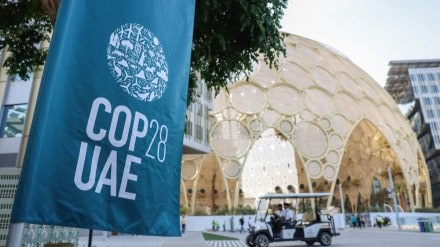By K Srinath Reddy
The 28th Conference of Parties (COP28) on climate has begun in Dubai, in the hottest year ever recorded in human history. Across continents, 2023 saw the calamitous consequences of global warming manifesting as heat waves, wild fires, floods, drought, hurricanes, rising sea levels and melting ice sheets.
In the Paris Agreement of 2015, the world committed to limiting rise in global temperature by 2100 to a maximum of 2°C above the pre-industrial age temperatures of the 18th century. The accord also aspired to achieve a 1.5°C target, to protect several island nations from being submerged under rising sea levels.
Within eight years of that affirmation, the world is hurtling towards the limit set for 2100.
The World Meteorological Organization warned in May 2023 that there was a “two in three chance” that the world will breach the 1.5°C target within the next 5 years.
Ominously, a study published in Nature Climate Change in October 2023 predicted that the planet will “lock in” 1.5°C of global warming by 2029, at the current rate of burning fossil fuels.
The appalling extent of human folly is apparent in the way the dateline of ‘Earth Overshoot Day’ or EOD (also called Planetary Overshoot Day) has receded over the last 50 years. The earth has a finite capacity to regenerate its natural resources every year. EOD marks the day when humanity has exhausted nature’s budget for that year. Ecological deficit for rest of the year draws on local resource stocks and accumulates carbon dioxide (CO2) in the atmosphere.
In 1970, EOD was on December 30. In 2023, EOD was on August 2. If we continue to draw on nature’s resources with extravagant imprudence and uncaring impudence, the EOD will recede further in near future and our accumulating deficits will bankrupt the planet.
Nearly four-fifth of the overall global carbon budget has been exhausted by now. If the world has to have a 50% chance of limiting global warming to 1.5°C, the US will need to achieve ‘net zero’ status by 2025 and Germany by 2030! With a nil probability of that happening, it is not surprising that the conversations at COPs have shifted from ‘mitigation’ (curbing climate change) to ‘adaptation’ (coping with its effects) to ‘loss and damage’ (compensation to countries suffering severe consequences).
As COP28 aims to apply brakes on global warming, it will address two key areas that pre-set timelines for 2023. Global Stocktake (GST) is a five year review of pledges made, progress achieved, gaps that need to be addressed and actions that must be undertaken from now on.
Even as fervent pleas for accelerated actions elicit fresh pledges for reducing emissions, geopolitics and commercial considerations may influence both the nature of commitments made and the extent to which they are subsequently delivered.
While usage of coal will continue to dominate discussions, demands by countries like India that non-coal emission sources like oil and natural gas must also set clear targets for reduction are unlikely to find support from countries which export them.
Action on coal alone will not enable us to stay below the 1.5°C limit, if non-coal fossil fuels are ignored. There is also a pressing need to address non-CO2 greenhouse gases like methane, oxides of nitrogen and sulphur and fluorinated gases. Will COP act earnestly to arrest the whole band of environmental assailants?
Also on the agenda will be the establishment and operationalisation of the ‘Loss and Damage Fund’. There is no clarity on who will pay and how much will be paid.
Developed countries have been ‘urged’ to contribute, while developing countries are ‘encouraged’. Since the initial COP classified countries as ‘developed’ and ‘developing’, several countries (like Qatar, South Korea, Singapore, and China) have moved up the economic ladder to qualify for a ‘rich country’ status.
Apart from reclassifying countries, the fund must be large enough to support relief, rehabilitation and restoration needs of countries which suffer severe effects of climate change. While the World Bank has been given the initial responsibility for administering the fund for four years, developing countries which will be severely affected by climate change must play a strong role in its management.
COP28 will also discuss how mitigation and adaptation measures will be needed to protect convergent interests of climate protection, nutrition security and population health. The Asian Development Bank is advancing climate and health discussions at the COP to catalyse development of climate-smart and climate-resilient health systems in low and middle-income countries.
Since the health sector globally contributes to 5.3% of greenhouse gas emissions, it has to promote energy conserving methods across all healthcare facilities and adopt green procurement practices to influence the whole supply chain. It also has to ensure that healthcare facilities become climate resilient by ensuring sturdy infrastructure, reliable transport and adequate personnel availability to withstand extreme weather events and respond efficiently to the health effects of climate change.
Agriculture and food systems contribute to climate change through livestock emissions, water intensive crops and energy intensive methods of farming. Agri-food systems will also suffer, as heat stress, water stress and rising carbon dioxide levels in the atmosphere reduce the yield, nutrient quality and durability of staple and non-staple crops. An Emirates Declaration is likely to be adopted at COP28 in which countries will pledge to reorient national and global agri-food systems to protect climate and promote nutrition security.
While the agenda of COP28 will be packed, there must be no deviation from the main mission of speedily halting the rise of global temperatures through impactful actions on all varieties of fossil fuels and other greenhouse gas sources. Otherwise, humans may not survive to record temperatures in 2100.
The author is a Distinguished professor of public health, PHFI.
Views are personal.
